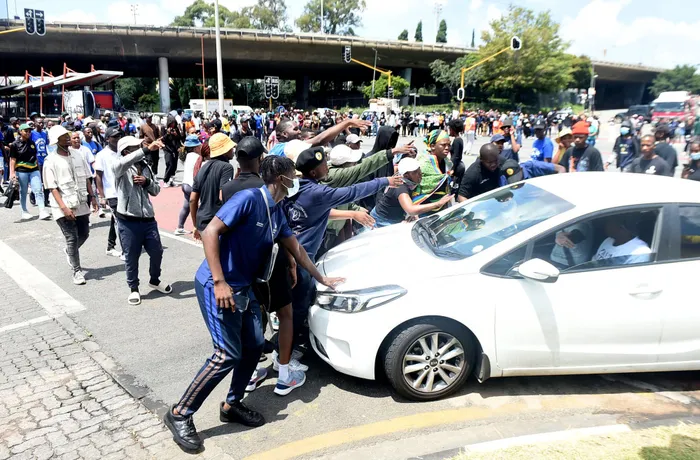Parliament concerned about overuse and over-reliance on armed private security in university clashes, calls for calm

Frustrated Wits students have been protesting over financial support and accommodation by blocking the campus entrance in Empire Road in Johannesburg. Picture: Itumeleng English/African News Agency (ANA)
The Portfolio Committee on Higher Education, Science and Innovation says it is concerned that universities call for armed security too early and student protests turn violent as a result.
It raised objections to the “overuse and over-reliance” on private security on campus as it “has no appreciation of institutional culture and cannot be held to account”.
In an urgent meeting with the South African Union of Students (Saus) and the South African Technical Vocational Education and Training Students Association (Satvetsa) this week, the Portfolio Committee on Higher Education, Science and Innovation said the protests and conflict at educational institutions across the country were worrying.
It has asked the Department of Higher Education and Training (DHET) and the student leadership to provide it with the number of students who have been arrested or served with suspension letters at these institutions.
It expressed concern over the arrests of University of KwaZulu-Natal students and the suspension of the Student Representative Council (SRC) president at Wits University.
The committee has since called for a revival of the stakeholder engagements and warned that in some cases, the absence of protests did not mean that the challenges had been addressed.
The committee said that at the meeting, the student governance bodies spoke about problems in the post-school education and training sector (PSET), highlighting specific universities and colleges.
Last year, the committee had a “2023 academic year state of readiness” meeting with the DHET, the National Student Financial Aid Scheme (NSFAS), Satvetsa, Saus, Universities South Africa (USAf) and the South African Public Colleges Organisation (Sapco).
After this meeting, the committee embarked on a two-week oversight visit programme. It visited 14 institutions of higher learning in KwaZulu-Natal, Limpopo and Mpumalanga. Following the visits, the committee had another meeting with the DHET and its stakeholders last month.
However, despite the recommendations the committee made, it said it remained concerned about the ongoing protests that had disrupted the start of the 2023 academic year.
“I am concerned that some of the institutions that we as the committee visited during the 2023 state of readiness oversights, were now having collisions; in particular Capricorn TVET College,” said committee chairperson Nompendulo Mkhatshwa.
The committee reiterated its recommendation on the revival of stakeholder engagements.
It said it supported students’ right to protest but that protesters must not infringe on the rights of others or destroy property.
The committee recommended training in civic education and conflict mediation, negotiation and resolution for all stakeholders in the PSET system, including the senior management of institutions.
The committee supported Saus and Satvetsa’s stance on R45 000 cap on student accommodation allowances for NSFAS students.
“The exorbitant prices of student accommodation cannot be normalised as these prices are tantamount to price fixing. The committee further recommends that the DHET and NSFAS reach out with speed to the Competition Commission to address issues of alleged collusion between private accommodation providers and officials of the institutions,” it said.
The committee emphasised that the cap on student accommodation not only looked at NSFAS-funded students, but took into account self-funded students who needed to be protected from price fixing by private accommodation providers.
The committee urged the DHET to finalise its work on the Ministerial Task Team on Student Funding and submit its reports.
Education